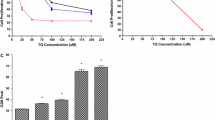Abstract
Vitamin K-related analogs induce growth inhibition in various cancer cell lines. A naphthoquinone analog, termed 2,3-dichloro-5, 8-dihydroxy-1,4-naphthoquinone (DDN), induces apoptosis in human promyeloid leukemic HL-60 cells, and shows antitumor activity in vivo. Following treatment with DDN, evidence of apoptosis, including DNA fragmentation and cleavage of poly ADP ribose polymerase (PARP), was observed. DDN induced an upregulation of proapoptotic Bax protein, and Bid cleavage. Antiapoptotic Bcl-2 protein levels were not changed by DDN, but the expression of Bcl-xL was decreased. In addition, DDN reduced the mass of solid tumor in the Sarcoma 180 tumor-bearing mouse model. These results indicate that DDN exerts antitumor activity, which appears to be related to the induction of apoptosis by regulating Bcl-2 family proteins.
Similar content being viewed by others
References
Finucane, D. M., Wetzel, E. B., Waterhouse, N. J., Cotter, T. G., and Green, D. R., Bax-induced caspase activation and apoptosis via cytochrome c release from mitochondria is inhibitable by Bcl-xL.J. Biol. Chem., 274, 2225–2233 (1999).
Giuliani, F. C., Zirvi, K. A., and Kaplan, N. O., Therapeutic response of human tumor xenografts in athymic mice to doxorubicin.CancerRes., 41, 325–335 (1981).
Green, D. R. and Reed, J. C., Mitochondria and apoptosis.Science, 281, 1309–1312 (1998).
Gross, A., McDonnell, J. M., and Korsmeyer, S. J., Bcl-2 family members and the mitochondria in apoptosis.Genes & Dev., 13, 1899–1911 (1999).
Ham, S. W., Par, H. J., and Lim, D. H., Studies on menadione as an inhibitor of the cdc25 phosphatase.Bioorg. Chem., 25, 33–36 (1997).
Ham, S. W., Park, J., Lee, S. J., Kim, W. H., Kang, K. H., and Choi, K. H., Naphthoquinone analogs as inactivators of cdc25 phosphatase.Bioorg. Med. Chem. Lett., 8, 2507–2510 (1998).
Hwang, Y. K., Kim, D. C., and Hwang, W. I., Antitumor effect of Mugwort(Artemisia princeps Pampan.)in vivo. Nat. Prod. Sci., 5, 1–6 (1999).
Juan, C. C. and Wu, F. H., Vitamin K3 inhibits growth of human hepatoma HepG2 cells by decreasing activities of both p34cdc2 kinase and phosphatase.Biochem. Biophys. Res. Commun., 190, 907–913 (1993).
Kang, K. H., Lee, K. H., Kim, M. Y., and Choi, K. H., Caspase-3-mediated cleavage of the NF-κB subunit p65 at the NH2 terminus potentiates naphthoquinone analog-induced apoptosis.J. Biol. Chem., 276, 24638–24644 (2001).
Kaufmann, S. H., Desnoyers, S., Ottaviano, Y., Davidson, N. E., and Poirier, G. G., Specific proteolytic cleavage of poly (ADP-ribose) polymerase: an early marker of chemotherapy-induced apoptosis.Cancer Res., 53, 3976–3985 (1993).
Kim, R., Tanabe, K., Uchida, Y., Emi, M., Inoue, H., and Toge, T., Current status of the molecular mechanism of anticancer drug-induced apoptosis.Cancer Chemother. Pharmacol., 50, 343–352 (2002).
Li, H., Zhu, H., Xu, C. J., and Yuan, J., Cleavage of BID by caspase 8 mediates the mitochondrial damage in the Fas pathway of apoptosis.Cell, 94, 491–501 (1998).
Nishikawa, Y., Carr, B. I., Wang, M., Kar, S., Finn, R., Paul, D., Zheng, Z. B., Kerns, J., and Naganathan, S., Growth inhibition of hepatoma cells induced by vitamin K and its analogs.J. Biol. Chem., 270, 28304–28310 (1995).
Okayasu, H., Ishihara, M., Satoh, K., and Sakagami, H., Cytotoxic activity of vitamins K1, K2 and K3 against human oral tumor cell lines.Anticancer Res., 21, 2387–2392 (2001).
Park, J. H., Kim, W. Y., Lee, Y. H., Moon, K. S., Kim, J. K., Kim, W. K., and Lee, S. K., Antitumor activity of the extract of unripe cotton ball.Yakhak Hoeji, 43, 23–27 (1999).
Wu, F. H., Chang, N. T., Chen, W. G., and Juan, C. C., Vitamin K3-induced cell cycle arrest and apoptotic cell death are accompanied by altered arrest and apoptotic cell death are accompanied by altered expression of c-fos and c-myc in nasopharyngeal carcinoma cells.Oncogene, 8, 2237–2244 (1993).
Zhang, L.,Yu, J., Park, B. H., Kinzler, K. W., and Vogelstein, B., Role of Bax in the apoptotic response to anticancer agents.Science, 290, 989–992 (2000).
Author information
Authors and Affiliations
Corresponding author
Rights and permissions
About this article
Cite this article
Kim, H.J., Mun, J.Y., Chun, Y.J. et al. Effects of a naphthoquinone analog on tumor growth and apoptosis induction. Arch Pharm Res 26, 405–410 (2003). https://doi.org/10.1007/BF02976698
Received:
Issue Date:
DOI: https://doi.org/10.1007/BF02976698




